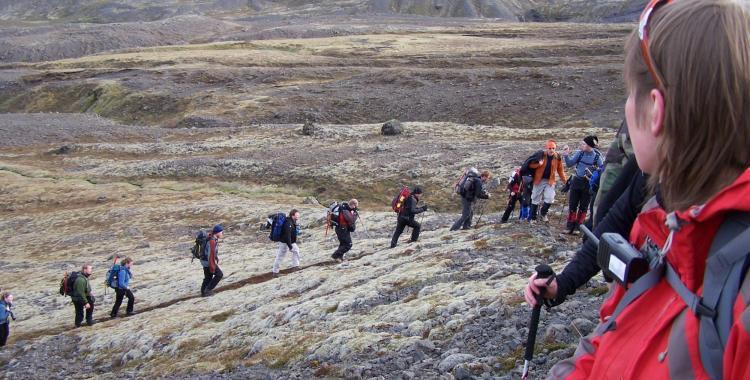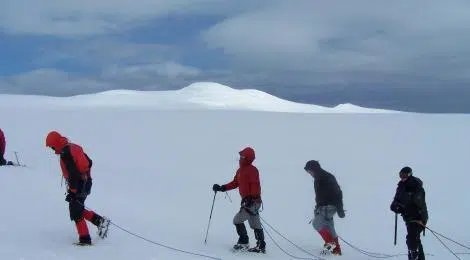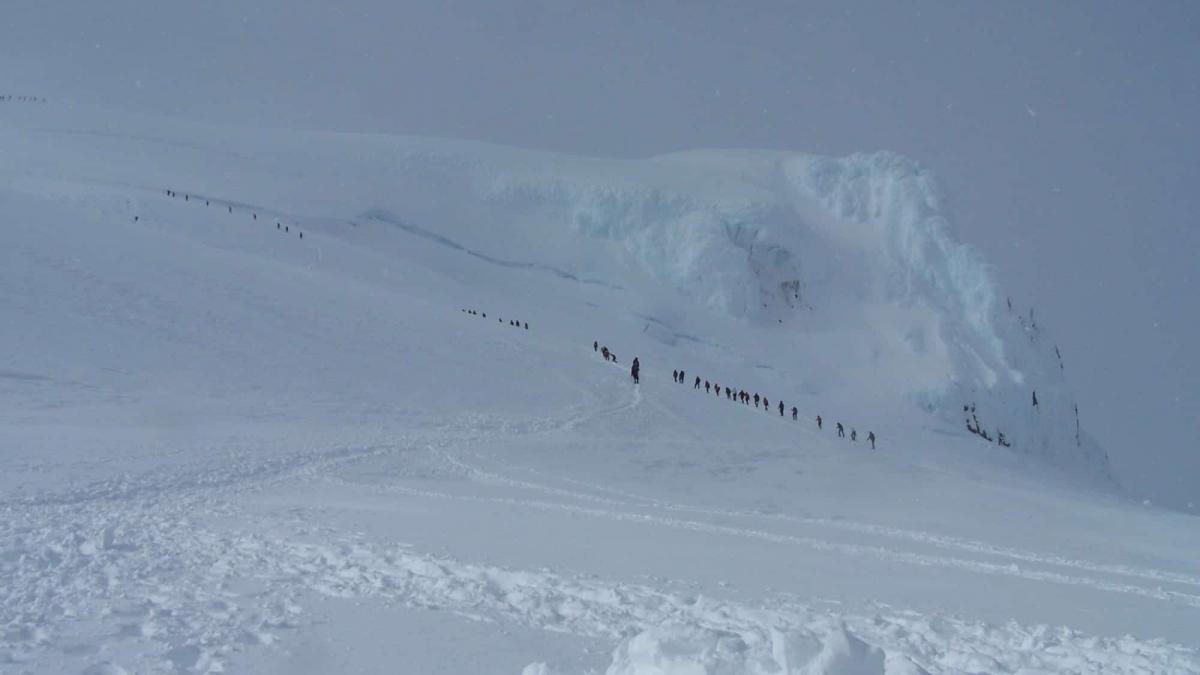Join 8,000 Iceland Travel Fans & Unlock Exclusive Discounts
Subscribe and instantly receive free discount codes for tours, car rentals, camper vans, and outdoor gear — carefully hand-picked to help you save on your Iceland adventure.
- ✔ Instant access to exclusive discount codes
- ✔ Savings on tours, car and camper rentals
- ✔ Tips and inspiration for planning your Iceland trip
To be fair, Iceland hasn´t really got any really high mountains. Highest Mountain in Iceland is Mt. Hvannadalshnjúkur which is “only” 2.110 meters high. This rather lonely and forbidding looking slab of ice is located on the southern tip of Europe´s largest glacier, the Vatnajokull glacier.
Stay safe!
Never go on an Icelandic glacier without being escorted by a professional guide. There are many companies that provide tours to Icelandic mountains and glaciers. I suggest you join a highly rated tour and prioritise quality rather than saving a few bucks. Good guides that keep you safe make all the difference.

Hiking highest Mountain in Iceland is a tough
I went up there with a large group of people back in June 2007 and it was a pretty tough journey. This was my first real hiking trip on a glacier but since I had been running quite a lot I was confident that I was in good enough shape for it. The main peak protrudes some 200 meters up from the flat glacial plateau which is on a top of a active volcano. Don´t worry though, there are so many active volcanoes in Iceland that one more doesn´t really make any difference. But should it blow, boy, it is going to be a big one.
Book a hotel and a flight to Iceland

Scorching hot killer lurking under the ice
This volcano has had two major eruptions during historical times. The first one took place in 1362 which devastated the countryside to the degree that an area that was called “Litla Hérað” and “Litte Shire” was renamed as “Öræfi which basically means “desert” or the “wasteland”. This was fitting as it emptied the countryside of people, who either fled or perished and there were decades before people return to live in the much diminished area.
Peak blown to bits
It is said that a another peak called Hnappafell which was right next to Hvannadalshhjúkur was blown to bits in this eruption. Geologists believe that the eruption emitted massive amounts of tephra or some 10KM3. This material covered the East and South East of Iceland. From my recent experience of the ash from the Eyjafjallajokull eruption I can tell you that this must have been pretty disgusting. The eruption of 1362 is estimated to be second largest eruption which has taken place in Iceland in the last 10.000 years. The impact of this catastrophic event on the people living in the vicinity and its livestock was probably similar to a nuclear attack. Mad Max would have felt right at home in the aftermath.
Horror stories from the eruption
There was another major eruption in 1727 which went on for a year and was devestating as well. It is estimated that the flood that was ejected from the glacier reached 100.000 m3/sec which is similar to the water volume of the Amazon. There are some horrific stories floating around about people being boiled alive in this flood but these stories sound a bit embellished.

Want to climb? Better be in shape then
But I digress. If you are still interested in running the gauntlet of this active volcano below the largest glacier in Europe the trip will involve the following given that you go the more common route called “Sandfellsleið” as opposed to an alternative and tougher route called “Virkisjökusleið”:
- Elevation gain: 2.000 meters
- Distance: 10,5 KM
- Duration of journey: 10-15 hours
The first leg of the hike involves an elevation gain of some 1.000 meters. When you have reached some 1.100 meters above sea level you reach the edge of the glacier. The guides split the groups into safety lines but they are totally mandatory up on the glacier as it can be riddled with crevices. You will also put on your crampon and you will be carrying an ice-ax on your back.

Keep walking people, keep walking
The second leg of the hike is from an height of 1100 meters up to 1.800 meters. This can be a bit of a challenge as it is a bit monotonous. You basically walk non stop up this really steep slope for ages. During my trip two people gave up from exhaustion and had to be escorted down by a guide. The rough weather we were experiencing wasn´t helping and at one point I was worried that we would suffer the same fate as a group that had to crawl down from the glacier before they reached the peak as the weather turned hellish in a blink of an eye. But the weather did not get worse.

Dude, you are an idiot
Finally, you reach the plateu and you will be thrilled to know that now you are walking along the edge of the caldera underneath the ice-sheet. When we had walked some time there a girl in my line stepped in a crevice and sank to her waist. The guy behind her just kept walking towards so the line connecting them didn´t really work to pull her up. I have to admit that the language I used to get him to get the **** back so she wouldn´t sink any further isn´t really appropriate for a family oriented travel magazine such as this. But I didn´t really get his attention until I yanked at the cord rather harshly. He woke up from his walk induced slumber and rather sheepishly stepped back to give her the leverage she needed to get out of the crevice.

Disaster strikes
Then disaster struck. A tourist who was not with our group stepped into a hole and twisted his ankle. Two of our guides had to get that guy down and I still think about how difficult it must have been. This meant that when we finally reached the peak we had to wait for ages as the ratio of guides to tourists was pretty messed up.

Standing on top of Iceland
Getting up and down the peak is tricky. The guides need to escort people up and down. We had to wait until a guide was available for our group but we finally got up there. We stood triumphant on top of Iceland. Unfortunately, the view from the top wasn´t that great since it was a bit foggy. But in theory you can have great view up there which could involve the stunning Hrutfjallstindar peaks which I scaled in 2010 during the infamous Eyjafjokull eruption.

The way down was pretty rough. We lucked out as the snow on the glacier hadn´t melted much during the day. Slogging in half melted snow for many kilometers is tough. Fortunately, we only had conditions like that for the last kilometer of glacier or so.
Explore Skaftafell
Mt. Hvannadalshnjukur is a part of the fantastic Skaftafell National Park. There is so much to see and do there.




